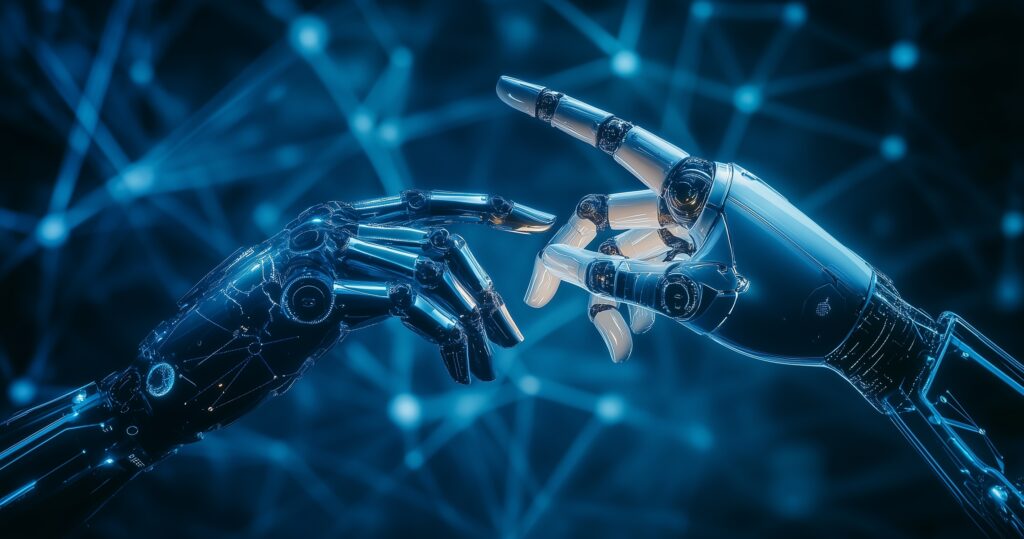Driving Progress with AI – Insights from an Industry Pioneer
 Dr Milica Đurić Jovičić, Director of the Innovation Center at the School of Electrical Engineering, University of Belgrade, shares her insights on the transformative power of artificial intelligence. In this interview, she discusses how AI is reshaping industries, enhancing innovation, and driving a future where technology and creativity converge to address global challenges.
Dr Milica Đurić Jovičić, Director of the Innovation Center at the School of Electrical Engineering, University of Belgrade, shares her insights on the transformative power of artificial intelligence. In this interview, she discusses how AI is reshaping industries, enhancing innovation, and driving a future where technology and creativity converge to address global challenges.
Within your position on the Governing Board of the Science Europe, you have been following development of AI globally and different national strategies. As an introduction from an expert, could you summarize current challenges and opportunities, as observed from the European angle?
Artificial intelligence is transforming the landscape of science and innovations, making it essential to address challenges and opportunities at a systemic level. At the recent event organized in Budapest (as the Hungary took over the EU presidency), Science Europe organized High Level Workshop on European Research Area with a dedicated topic “Exploring the Benefits of Artificial Intelligence in Science Policy to Strengthen European R&I”. With high level representatives from nearly all European countries, as well as invited guests from different continents, we discussed pressing challenges like global access to AI models, infrastructure, funding, capacity building, and the need for European strategic autonomy in AI, also showcasing successful initiatives from different countries. To fully harness AI’s potential, European countries must strengthen international and regional collaboration, join resources, make responsible investments in AI infrastructure, and develop tailored training programs to address skills gaps.
What challenges do European countries, especially smaller ones, face regarding access to leading AI models and platforms?
Many research organizations rely on third-party proprietary AI platforms or models developed outside Europe. With the current state of global tensions around the world, access to AI models can be restricted by export controls and sanctions. Major AI-developing nations can limit the availability of state-of-the-art tools and hinder collaboration with global partners.
As nations prioritize their local AI systems, there is an increased risk of region-specific biases in AI models, which may not align with European research values or standards. Furthermore, this trend undermines Europe’s ability to maintain strategic autonomy in AI research and applications.
Research organizations must advocate for stable and diversified funding mechanisms, reducing reliance on resources that are vulnerable to geopolitical dynamics. Together, we need to build a resilient AI ecosystem that aligns with its scientific and ethical principles.
AI-powered research and innovations require new collaborations and creating interdisciplinary teams (researchers, AI scientists, and engineers who can focus together on identified challenges and create new AI models). Collaborations between academia, industry, and policymakers are essential to align AI innovations with real-world needs.
European collaboration and investment are vital to harness AI’s potential fully
To those who did not study engineering or mathematics, AI may seem too advanced technology, beyond their skills. Some may feer of using it in an inadequate way, and responsibility for that. How can we develop needed skills which are fit to our area of work? How can organizations train their employees to exploit the capabilities of AI models and potentials?
In general, despite many available AI tools, their full potential is not being used as many organizations are still facing several barriers, including skills gap, and limited resources, especially for smaller organizations. In parallel with mastering the technological aspects, ethical and legal concerns must also be taken with care. To overcome these barriers, research organizations and also high education institutions can design and organize modular training programs and mentorship programs, which would be tailored to the technical education and capabilities of the researchers from that institution and domain-specific applications.
Innovation Center of the School of Electrical Engineering has a dedicated life-long learning laboratory with a number of courses designed for other research organizations or partners from industry. This is designed based on a recognized need from our partners to follow up with the latest technologies, organize data, select optimal algorithms for their problem or area of application, and verify the results.
Designing a specialized hubs within research organization, or cluster of organizations with similar domain can also be a practical way to combine resources and provide access to skills and needed computational resources.

How can we trust AI when it comes to sensitive areas of applications? How can we know is it safe to exploit the AI results?
AI obtained results must be tested. This was also one of the topics I presented at the Science Europe event. To validate AI tools effectively, we must invest in testbeds and pilots within real research environments, allowing these tools to be refined and adapted for practical use.
If not developed properly, either due to wrong selection of algorithms, data, or many other reasons, AI tools can produce biased results, make incorrect predictions, or even cause harm in sensitive areas of applications like healthcare, finance, or autonomous systems. Verification ensures that the AI system functions as needed, aligns with regulations and can be trusted by users.
To benefit from AI-results across areas, sectors, and countries/nations, Europe should also have standardization for developed AI tools (as part of their verification process before receiving certification for that standard, AI tools should prove ethics, performance, precision/accuracy, and other key aspects). Together, we can create a resilient AI ecosystem that aligns with Europe’s scientific and ethical values.
What are the potentials of high education, science and innovation in Serbia to follow the progress of AI? Is there an interest from foreign research organizations or industries to collaborate with Serbian organizations in AI projects?
Serbia has significant potential to follow and contribute to the progress of AI. Our academic institutions, particularly those with a legacy of excellence in engineering and computer science, have produced skilled professionals who are now active in cutting-edge AI research and development globally. Serbia has highly skilled and educated workforce in electrical and software engineering and AI related fields. As an example, during my recent visit to some of the best French universities, institutes, and deep tech companies, I received confirmation of the excellent reputation of our students and engineers for their education and work ethics, followed by a strong interest in future collaboration with us. The focus of my visit included development of partnership in AI related topics, so it was exceptionally important to match our expertise and identify future possibilities for collaboration.
However, to fully capitalize on these opportunities, we must address key challenges. Investments in infrastructure, interdisciplinary research, and partnerships with international organizations are crucial. Strengthening collaboration between academia and industry can accelerate the application of AI solutions across sectors. Furthermore, nurturing talent through tailored AI programs and initiatives will help bridge the skills gap, enabling Serbia to play a significant role in the global AI landscape while driving innovation locally.
Belgrade’s School of Electrical Engineering has pioneered AI since the 1960s
Your faculty has a long history of innovations in AI, dating back to mid 20th century. How has this legacy shaped your current approach to integrate AI into research and education?
As one of the pioneers in AI in this part of Europe, School of Electrical Engineering in Belgrade has been shaping the field since 1960s, with advancements in robotics, automatic control for manufacturing processes, and expert systems for power engineering. Today, nearly all departments at our faculty actively incorporate AI into their research and teaching, ensuring that future generations of engineers are equipped to drive progress responsibly.
Innovation Center has dedicated laboratory for Software Engineering and AI, but AI is also a crucial part of some other laboratories such as eHealth and Biomedical Engineering, or Internet of Everything. AI is used in our research and development projects, including projects with different industries. As our engineering legacy, while we push the boundaries of technology, we must ensure AI serves the greater good, upholds ethical standards, and contribute to humanity’s well being. For this reason, we select our topics and partners carefully, and commit to creating AI solutions that are driving positive change across industries, communities, individuals and environment.